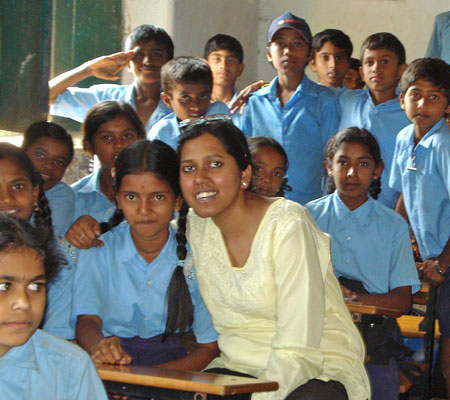Out of the female closet: Menstrual hygiene matters
May 9, 2014

The following essay was written by Lakshmi Gopalakrishnan, Fulbright Scholar from India and maternal and child health master’s degree candidate at UNC’s Gillings School of Global Public Health. Gopalakrishnan has conducted research in India on menstrual hygiene management. The essay, reprinted here with permission, originally appeared in a May 8 Interagency Youth Working Group blog. Photo of Gopalakrishnan (at left) by Jayanta Bora.
May 1, 2014, marked the beginning of a 28-day global campaign called Menstravaganza, and the first-ever Menstrual Hygiene Day will be celebrated on May 28.
What is this day all about?
It is a day to create awareness about menstruation and demystify taboos that have long prohibited girls and women from realizing their full potential. It serves as a mechanism to bring all stakeholders together – including individuals, organizations and the media.

Gopalakrishnan recently completed her master’s thesis project on menstrual hygiene practices in India. Prior to coming to UNC, she worked on several social sector projects. Here, she is pictured with children in a classroom in Gulbarga (Karnataka), where she collected data for a school meal program in India.
On any given day, 300 million women and girls are menstruating worldwide. Although menstruation is a normal physiological phenomenon for women, it is still considered taboo in many cultures worldwide. Further complicating the situation is the silence around the topic, which has resulted in a lack of awareness and poor knowledge among women about their own bodies.
Another important issue is the dismal lack of knowledge about management and proper disposal of hygienic material. While there is lack of comparable global data, community-based studies indicate that 68 percent of girls in Ghana, 70 percent of girls in India, and 40 percent of girls in Nigeria knew nothing about menstruation when they started their periods. Many of these girls consider menstrual blood to be impure, and some even believe it results from disease or cancer.
There is an urgent need to begin serious conversation about this topic.
In parts of Bangladesh, women and girls who have their periods sneak off to the wells before sunrise to wash themselves before other family members are up; they hide their cloths and refrain from talking about their periods. In instances where they discuss menstruation, it is usually with elder women of the family whose advice is often ill-informed and riddled with superstitions.
These occurrences are common in many developing countries. Many school girls experience embarrassment, stigma, pain and discomfort when they have their periods, and yet the issue continues to be shrouded in secrecy. Furthermore, many girls face hardships trying to buy sanitary napkins because of their cost. Even if girls have access to absorbent materials, often they do not have access to functional toilets with running water or safe, private spaces to change and dispose of the material.
It is evident that menstruation affects several areas of a girl’s life. Multiple studies have indicated that menstruation leads to school absenteeism because girls lack access to hygienic materials and related sanitation facilities. A few studies have indicated that re-use of dirty rags also causes reproductive tract infections and skin irritation.
Overall, poor menstrual hygiene is a violation of girls’ right to water, sanitation, hygiene, health, education and gender equity. Finding solutions will require multifaceted interventions that include proper access to menstrual hygiene products, development of sanitation facilities, and quality education about puberty for girls and boys. We also must emphasize that making men more sensitive to the problem can go a long way in debunking negative perceptions around menstrual hygiene.
Are we ready to break the silence?
This Menstrual Hygiene Day, let each one of us pledge to break the silence around this issue for an improved quality of life for girls and women across the world. Celebrate menstruation. Celebrate women and girls.
#menstruationmatters. Learn more online.
